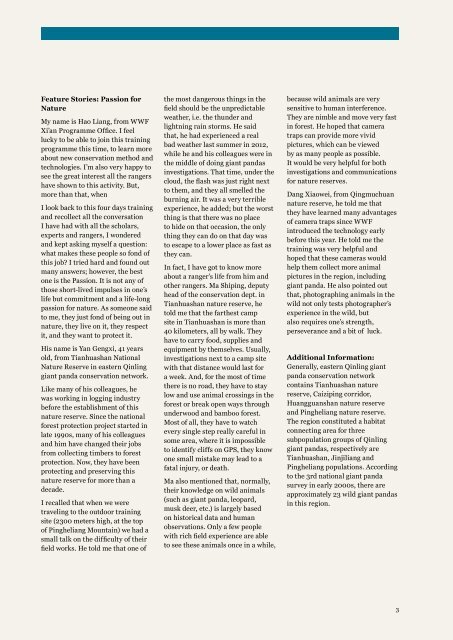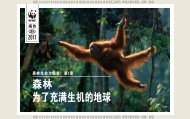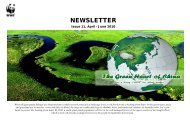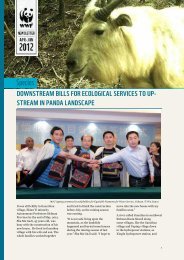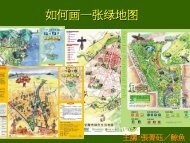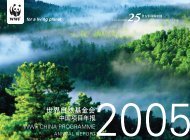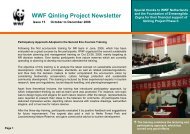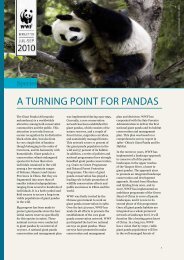Species
Species
Species
You also want an ePaper? Increase the reach of your titles
YUMPU automatically turns print PDFs into web optimized ePapers that Google loves.
Xxxxxx xxxx<br />
Feature Stories: Passion for<br />
Nature<br />
My name is Hao Liang, from WWF<br />
Xi’an Programme Office. I feel<br />
lucky to be able to join this training<br />
programme this time, to learn more<br />
about new conservation method and<br />
technologies. I’m also very happy to<br />
see the great interest all the rangers<br />
have shown to this activity. But,<br />
more than that, when<br />
I look back to this four days training<br />
and recollect all the conversation<br />
I have had with all the scholars,<br />
experts and rangers, I wondered<br />
and kept asking myself a question:<br />
what makes these people so fond of<br />
this job? I tried hard and found out<br />
many answers; however, the best<br />
one is the Passion. It is not any of<br />
those short-lived impulses in one’s<br />
life but commitment and a life-long<br />
passion for nature. As someone said<br />
to me, they just fond of being out in<br />
nature, they live on it, they respect<br />
it, and they want to protect it.<br />
His name is Yan Gengxi, 41 years<br />
old, from Tianhuashan National<br />
Nature Reserve in eastern Qinling<br />
giant panda conservation network.<br />
Like many of his colleagues, he<br />
was working in logging industry<br />
before the establishment of this<br />
nature reserve. Since the national<br />
forest protection project started in<br />
late 1990s, many of his colleagues<br />
and him have changed their jobs<br />
from collecting timbers to forest<br />
protection. Now, they have been<br />
protecting and preserving this<br />
nature reserve for more than a<br />
decade.<br />
I recalled that when we were<br />
traveling to the outdoor training<br />
site (2300 meters high, at the top<br />
of Pingheliang Mountain) we had a<br />
small talk on the difficulty of their<br />
field works. He told me that one of<br />
the most dangerous things in the<br />
field should be the unpredictable<br />
weather, i.e. the thunder and<br />
lightning rain storms. He said<br />
that, he had experienced a real<br />
bad weather last summer in 2012,<br />
while he and his colleagues were in<br />
the middle of doing giant pandas<br />
investigations. That time, under the<br />
cloud, the flash was just right next<br />
to them, and they all smelled the<br />
burning air. It was a very terrible<br />
experience, he added; but the worst<br />
thing is that there was no place<br />
to hide on that occasion, the only<br />
thing they can do on that day was<br />
to escape to a lower place as fast as<br />
they can.<br />
In fact, I have got to know more<br />
about a ranger’s life from him and<br />
other rangers. Ma Shiping, deputy<br />
head of the conservation dept. in<br />
Tianhuashan nature reserve, he<br />
told me that the farthest camp<br />
site in Tianhuashan is more than<br />
40 kilometers, all by walk. They<br />
have to carry food, supplies and<br />
equipment by themselves. Usually,<br />
investigations next to a camp site<br />
with that distance would last for<br />
a week. And, for the most of time<br />
there is no road, they have to stay<br />
low and use animal crossings in the<br />
forest or break open ways through<br />
underwood and bamboo forest.<br />
Most of all, they have to watch<br />
every single step really careful in<br />
some area, where it is impossible<br />
to identify cliffs on GPS, they know<br />
one small mistake may lead to a<br />
fatal injury, or death.<br />
Ma also mentioned that, normally,<br />
their knowledge on wild animals<br />
(such as giant panda, leopard,<br />
musk deer, etc.) is largely based<br />
on historical data and human<br />
observations. Only a few people<br />
with rich field experience are able<br />
to see these animals once in a while,<br />
because wild animals are very<br />
sensitive to human interference.<br />
They are nimble and move very fast<br />
in forest. He hoped that camera<br />
traps can provide more vivid<br />
pictures, which can be viewed<br />
by as many people as possible.<br />
It would be very helpful for both<br />
investigations and communications<br />
for nature reserves.<br />
Dang Xiaowei, from Qingmuchuan<br />
nature reserve, he told me that<br />
they have learned many advantages<br />
of camera traps since WWF<br />
introduced the technology early<br />
before this year. He told me the<br />
training was very helpful and<br />
hoped that these cameras would<br />
help them collect more animal<br />
pictures in the region, including<br />
giant panda. He also pointed out<br />
that, photographing animals in the<br />
wild not only tests photographer’s<br />
experience in the wild, but<br />
also requires one’s strength,<br />
perseverance and a bit of luck.<br />
Additional Information:<br />
Generally, eastern Qinling giant<br />
panda conservation network<br />
contains Tianhuashan nature<br />
reserve, Caiziping corridor,<br />
Huangguanshan nature reserve<br />
and Pingheliang nature reserve.<br />
The region constituted a habitat<br />
connecting area for three<br />
subpopulation groups of Qinling<br />
giant pandas, respectively are<br />
Tianhuashan, Jinjiliang and<br />
Pingheliang populations. According<br />
to the 3rd national giant panda<br />
survey in early 2000s, there are<br />
approximately 23 wild giant pandas<br />
in this region.<br />
3


